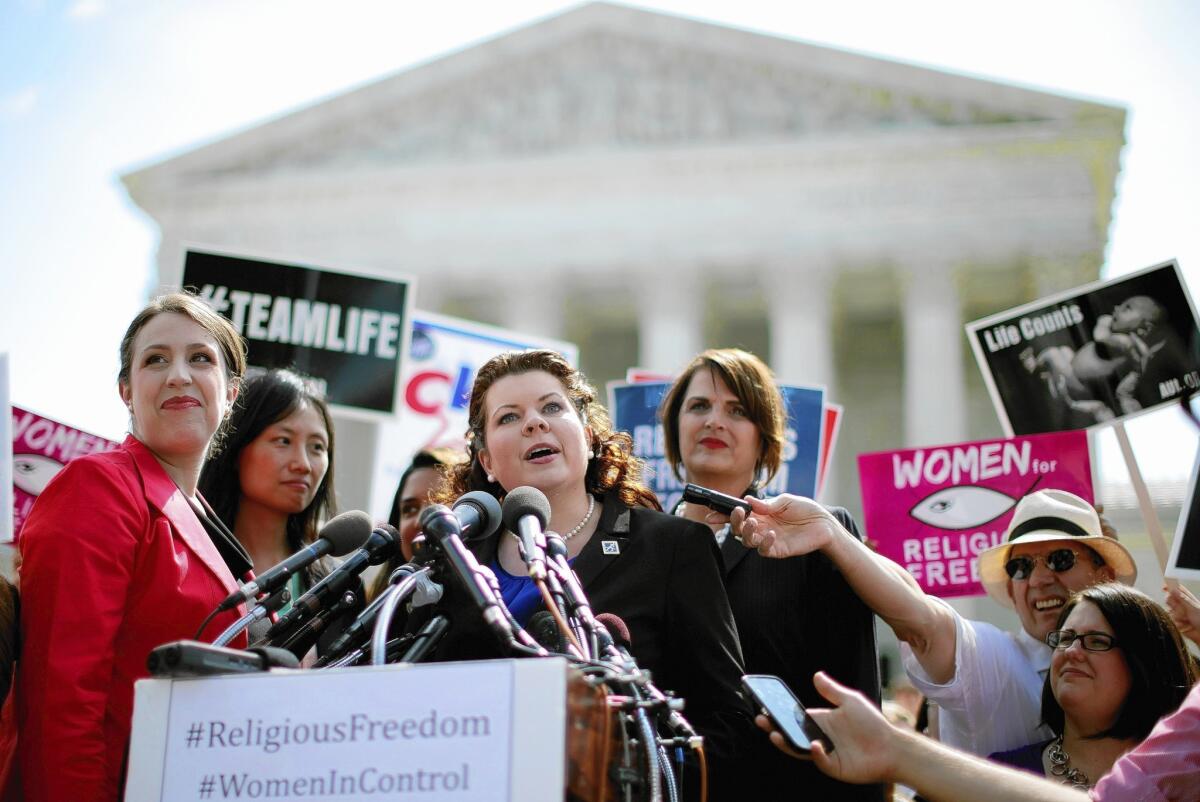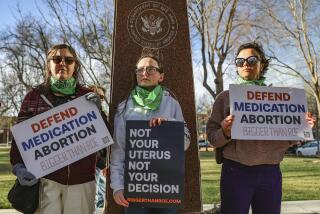Law firm in Hobby Lobby win is playing key role in religion cases

- Share via
Reporting From WASHINGTON — The Supreme Court’s controversial Hobby Lobby decision has thrust a once-little-known boutique law firm into the center of a growing conservative movement to make faith-based exemptions as potent a legal tool as free speech has been for liberals.
The tiny Becket Fund for Religious Liberty was the legal power behind the high court’s decision last month to extend religious rights to corporations for the first time. Before that, the Washington firm’s attorneys successfully defended a church school’s religious right to be exempted from federal antidiscrimination rules and, in another case, even persuaded the progressive U.S. 9th Circuit Court of Appeals to keep “under God” in school recitations of the Pledge of Allegiance.
With just a dozen full-time attorneys, the fund’s string of high-court successes is earning it a reputation in legal circles as a powerhouse, though its leaders downplay talk about the firm’s growing influence.
“We had a good laugh,” said Kristina Arriaga, the firm’s executive director, when asked about the nationwide attention that followed the Supreme Court’s June 30 Hobby Lobby ruling.
It’s a bit of false modesty, however, since the fund also prides itself on being highly selective about the kinds of cases it accepts, looking for appellate-level lawsuits that have the ability to change legal precedents.
“We defend religious liberty as a principle, in and of itself,” Arriaga said. “We believe religious liberty is not about who God is. It’s about who we are.”
In the Hobby Lobby ruling, justices ruled that the religious owners of the chain of craft stores do not have to provide full contraceptive coverage for female workers as required under the Affordable Care Act. In her dissent, Justice Ruth Bader Ginsburg said the decision carried “startling breadth” and would open the door for other religious-minded businesses to seek exemptions from federal laws.
Previously, the Becket Fund played a key role in the Supreme Court’s unanimous 2012 decision that gave broader powers to churches and religious schools to circumvent federal anti-discrimination laws. Becket successfully defended the Michigan church school that had fired a teacher after she claimed she was discriminated against because of her narcolepsy.
“They are smart, they are hardworking, and they are prepared,” said Ira Lupu, law professor emeritus at George Washington University. “And they win.”
The fund’s legal work is always offered free of charge, funded by about $5 million last year from donors and grants, according to tax records. Of the 170 cases it’s taken since it began in 1994, the firm boasts an impressive 87% success rate.
Compare that to Alliance Defending Freedom, another religious liberty law firm started in 1994, which took in nearly $40 million last year, has 44 in-house attorneys and delivered an 80% success rate.
Becket founder Kevin “Seamus” Hasson, who stepped down as president in 2011 because of Parkinson’s disease, has said he created the fund in response to a “culture war” in the U.S., hoping to preserve religious rights from what he saw as a half-century-long assault by the secular movement.
The fund insists it represents all denominations, from “A to Z, from Anglicans to Zoroastrians.” It once defended a Texas Santeria priest who wanted to sacrifice goats at home. This fall the firm heads back to the Supreme Court to represent a Muslim inmate prevented by prison rules from growing a beard in keeping with his faith.
“We need to defend the rights of other people who believe in something — even if we think they believe in the wrong thing,” Hasson said in a 2012 Heritage Foundation speech. “In so doing, we are sticking up for all believers against the nihilists. We are standing tall for those who are convinced there is a truth, against those who are opposed to the very idea of anybody making truth claims in public.”
But critics say in recent years Becket has turned its focus primarily toward representing Christians and the religious right.
“They’ve become more ideologically conservative,” said Rev. Barry Lynn, executive director of Americans United for Separation of Church and State, a Washington-based advocacy group. “Where they have ended up today is a point far to the right of the political mainstream.”
Years ago, the fund focused on cases that would have aided all religions, such as land-use and zoning disputes that several religious groups said prevented them from practicing their faith, according to Robert Tuttle, professor of law and religion at George Washington University. Today the firm’s work appears more political, more conservative and more Christian, Tuttle said.
When the Supreme Court ruled in May that city councils may start public meetings with explicitly Christian prayers, many religious liberty groups criticized the ruling, warning it would favor Christianity over other religions. Becket heralded the decision as a “great victory.”
“It’s not a consistent view of religious liberty,” Tuttle said. “I don’t remember Becket 15 years ago playing up the culture wars fight, and now it’s a big part of their appeal.”
The representation of Christians opposed to the Obamacare contraceptive mandate is another example, critics say. The firm has eight open cases that seek exemptions, including those of Illinois-based Wheaton College and Colorado’s Little Sisters of the Poor, which both won temporary injunctions from the high court.
Hasson, a devout Catholic and former church-state advisor in the Reagan-era Justice Department, was replaced by William Mumma, who, at Hasson’s request, left a 30-year career as a Wall Street executive to head the firm.
Arriaga said Becket has almost doubled its staff and attracted more donors under Mumma’s leadership, but she disputed that the firm has altered its approach, saying it merely reflects the shift in the kinds of religious liberty lawsuits being filed. She said government efforts to legislate sensitive issues, such as contraception and same-sex marriage, were fueling Becket’s caseload.
“We find there has been an aggressive push from the government to become the sole arbiter of morality, which is not good for our country,’’ she said. “Regrettably, religious liberty work has augmented exponentially.”
More to Read
Sign up for Essential California
The most important California stories and recommendations in your inbox every morning.
You may occasionally receive promotional content from the Los Angeles Times.










